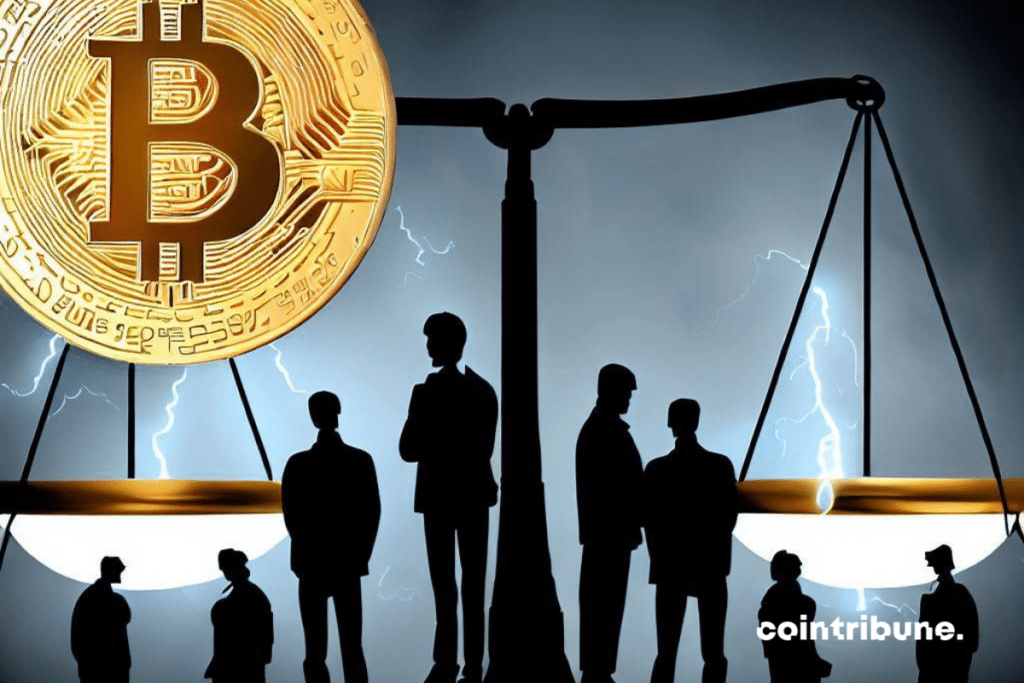Bitcoin ETF : The new danger for investors?
In an instant, passions flare, rumors rumble, and the financial world is in turmoil. Bitcoin ETFs, which have recently come under the spotlight, seem to be unleashing all kinds of passions. On the one hand, some are crying wolf, suggesting imminent dangers for investors. On the other, there are those who defend these newcomers as a genuine opportunity. So, between myth and reality, where does the truth lie?

Cryptocurrencies’ dark past: a heavy legacy to bear?
The glitter of technological progress sometimes conceals worrying grey areas. In the space of a decade, the crypto industry has suffered staggering losses of $2 trillion, a fact highlighted by Better Markets legal counsel Scott Farnin in his letter to the SEC.
He also points to the bankruptcies, sanctions and legal proceedings that mark this trajectory, acting as red flags for neophytes.
In addition, cases of lies, deceit and theft are all deafening echoes in the arena of this digital currency. The main beneficiaries? Criminals who use cryptocurrency to facilitate illegal actions: ransomware, money laundering and other dubious activities. It is against this backdrop that the letter reminds us of the importance of analyzing recent Bitcoin ETF proposals.
Bitcoin ETFs: Warnings vs. regulated potential
Scott Farnin has highlighted the concerns of many institutions regarding the risk associated with Bitcoin ETFs. However, shouldn’t we be asking whether these losses are directly related to the existence of ETFs, or rather to the volatile and unregulated nature of the crypto market itself? Especially since regulation, precisely, aims to mitigate these risks.
Although criminals have found ways to exploit cryptocurrency, it would be a reductive view to say that they are the only beneficiaries. Many legitimate businesses, investors and innovators around the world have embraced blockchain technology to revolutionize sectors ranging from finance to healthcare.
As for concerns about oversight and regulation, it is precisely the introduction of financial instruments such as ETFs that could encourage stricter regulation and increased oversight, making the market more transparent and less susceptible to manipulation.
The hidden opportunity behind Bitcoin ETFs
When it comes to Bitcoin ETFs, it’s essential not to overlook their potential. For sophisticated investors, they represent an unprecedented opportunity to diversify their portfolios.
Is it any surprise, then, that many financial players are looking to position themselves in this promising sector, despite the risks? Regulations exist to evolve, and perhaps the guardians of the financial temple, such as the SEC, will end up seeing in these ETFs a chance to further democratize the crypto sector, while making it safer.
Like the alchemists of old seeking to turn lead into gold, the financial sector is on a constant quest for the next big thing. Bitcoin ETFs, despite the controversies, could well be that much sought-after philosopher’s stone.
It’s crucial not to close the door on innovation, because behind every risk lies an opportunity. But time will tell: will these ETFs be the new Eldorado, or the smoke and mirrors of modern investors? Only time, that impartial judge, will tell. In the meantime, Ripple has no qualms about breaking down borders beyond the USA.
Maximize your Cointribune experience with our "Read to Earn" program! For every article you read, earn points and access exclusive rewards. Sign up now and start earning benefits.

Fascinated by Bitcoin since 2017, Evariste has continuously researched the subject. While his initial interest was in trading, he now actively seeks to understand all advances centered on cryptocurrencies. As an editor, he strives to consistently deliver high-quality work that reflects the state of the sector as a whole.
The views, thoughts, and opinions expressed in this article belong solely to the author, and should not be taken as investment advice. Do your own research before taking any investment decisions.